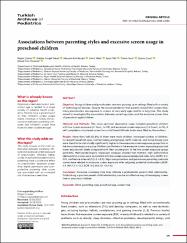| dc.contributor.author | Çaylan, Nilgün | |
| dc.contributor.author | Yalçın, Sıddıka Songül | |
| dc.contributor.author | Erat Nergiz, Meryem | |
| dc.contributor.author | Yıldız, Deniz | |
| dc.contributor.author | Oflu, Ayşe | |
| dc.contributor.author | Tezol, Özlem | |
| dc.contributor.author | Çiçek, Şeyma | |
| dc.contributor.author | Foto Özdemir, Dilşad | |
| dc.date.accessioned | 2022-05-27T08:32:03Z | |
| dc.date.available | 2022-05-27T08:32:03Z | |
| dc.date.issued | 12.01.2021 | en_US |
| dc.identifier.citation | Çaylan, N., Yalçın, S. S., Nergiz, M. E., Yıldız, D., Oflu, A., Tezol, Ö., ... & Foto-Özdemir, D. (2021). Associations between parenting styles and excessive screen usage in preschool children. Turkish Archives of Pediatrics, 56(3), 261-266. | en_US |
| dc.identifier.issn | 2757-6256 | |
| dc.identifier.uri | https://doi.org/10.14744/TurkPediatriArs.2020.43765 | |
| dc.identifier.uri | https://hdl.handle.net/20.500.12933/1101 | |
| dc.description.abstract | Objective
Young children and preschoolers are now growing up in settings filled with a variety of technological devices. Despite the recommendation that parents should limit screen time, many preschoolers are exposed to screens at very early ages and for a long time. This study aimed to investigate the associations between parenting styles and the excessive screen time of preschool-aged children.
Material and Methods
This cross-sectional descriptive study included preschool children with low screen exposure (<1 hour; n=176) and excessive screen exposure (>4 hours; n=74). A self-completion-structured survey form and Parent Attitude Scale were filled by the mothers.
Results
More than half (52.0%) of them were male children. Increased number of children, increased household sizes, mothers being unemployed, birth order ≥2, and home-based care were found to be statistically significantly higher in the excessive screen exposure group than in the low screen exposure group. Mothers and fathers in the excessive screen exposure group had lower educational levels compared with their counterparts in the low screen exposure group (p<0.001). Multivariate logistic regression analyses showed that mothers’ high authoritative (democratic) scores were associated with low screen exposure(adjusted odds ratio (AOR): 0.3; 95% confidence interval (CI): 0.1–0.9). High overprotective and permissive parenting subscale scores were related to excessive screen exposure after adjusting potential confounders (AOR: 2.8, 95% CI: 1.1–6.7; AOR: 4.5, 95% CI: 1.8–11.6).
Conclusion
Excessive screening time may indicate a problematic parent-child relationship. Establishing a positive parent-child relationship can be an effective way of managing screen time in preschool children. | en_US |
| dc.language.iso | eng | en_US |
| dc.publisher | AVES Yayıncılık | en_US |
| dc.relation.isversionof | 10.14744/TurkPediatriArs.2020.43765 | en_US |
| dc.rights | info:eu-repo/semantics/openAccess | en_US |
| dc.subject | Child | en_US |
| dc.subject | Parenting style | en_US |
| dc.subject | Preschool age | en_US |
| dc.subject | Screen time | en_US |
| dc.title | Associations between parenting styles and excessive screen usage in preschool children | en_US |
| dc.type | article | en_US |
| dc.authorid | 0000-0002-5389-2220 | en_US |
| dc.department | AFSÜ, Tıp Fakültesi, Dahili Tıp Bilimleri Bölümü, Çocuk Sağlığı ve Hastalıkları Ana Bilim Dalı | en_US |
| dc.contributor.institutionauthor | Oflu, Ayşe | |
| dc.identifier.volume | 56 | en_US |
| dc.identifier.issue | 3 | en_US |
| dc.identifier.startpage | 261 | en_US |
| dc.identifier.endpage | 266 | en_US |
| dc.relation.journal | Turkish Archives of Pediatrics | en_US |
| dc.relation.publicationcategory | Makale - Uluslararası Hakemli Dergi - Kurum Öğretim Elemanı | en_US |
















